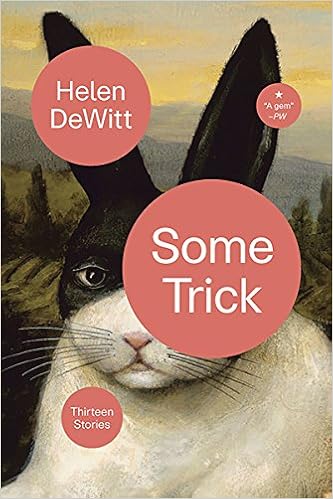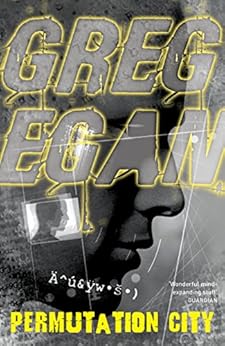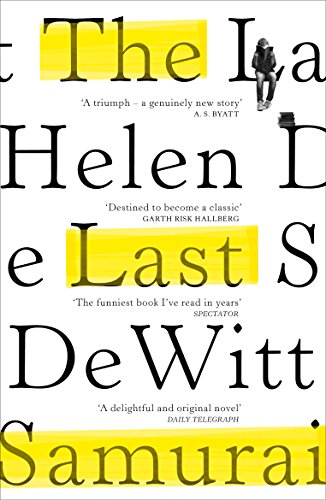 |
| Amazon link |
Helen DeWitt, author, has had a troubled life.
"Many, many writers are chronically broke. Many have a long list of grievances with the publishing industry. Many will tell you about the circumstances that would have allowed them to enjoy the success of Ernest Hemingway or David Foster Wallace. Many have had multiple brushes with suicide, but there’s only one who wrote The Last Samurai and Lightning Rods, two of the finest novels published this century, and she’d recently spilled a glass of iced tea on her MacBook. ...I reviewed it here.
"The Last Samurai was a sensation even before it appeared. The toast of the Frankfurt Book Fair in 1999, with rights sold to more than a dozen countries, the novel came out in 2000 to wide acclaim, sold in excess of 100,000 copies in English, and was nominated for several prizes. But for DeWitt, this was the beginning of a long phase of turmoil that still hasn’t abated.
The book’s success was marred by an epic battle with a copy editor involving large amounts of Wite-Out; typesetting nightmares having to do with the book’s use of foreign scripts; what she describes as “an accounting error” that resulted in her owing the publisher $75,000 when she thought the publisher owed her $80,000; the agonies of obtaining permissions for the many outside works quoted in the novel, including Akira Kurosawa’s The Seven Samurai — which was the title of The Last Samurai until it was deemed legally impossible."
---
And then there are the suicide attempts:
"Once, after a book deal that she negotiated herself fell apart, she took a sedative and put a plastic bag over her head, but she couldn’t fall asleep. She sent an email to a lawyer asking that she ignore the previous email about disposing of her corpse. She went to Niagara Falls, but by the time she got there Reuters had reported her disappearance and a policeman picked her up on the street and took her to a hospital.So Helen DeWitt appears to be living in poverty in Berlin, appealing on her website for people to buy her a coffee online. She has suggested she might be 'on the spectrum' and calls herself a rationalist.
"Six years later, after the agent Bill Clegg failed to sell Lightning Rods to about a dozen publishers and resigned as her agent, she sent him a suicide email and set out to throw herself off a cliff near Brighton. She halted the plan after her ex-husband wrote saying he was expecting his first child with his second wife."
Here's a bit of author bio:
"DeWitt grew up primarily in Latin America (Mexico, Brazil, Colombia and Ecuador), as her parents worked in the United States diplomatic service. After a year at Northfield Mount Hermon School and two short periods at Smith College, DeWitt studied classics at the University of Oxford, first at Lady Margaret Hall, and then at Brasenose College for her D.Phil.DeWitt knows, in descending order of proficiency, Latin, ancient Greek, French, German, Spanish, Italian, Portuguese, Dutch, Danish, Norwegian, Swedish, Arabic, Hebrew, and Japanese.
DeWitt is best known for her debut novel, The Last Samurai. She held a variety of jobs while struggling to finish a book, including a dictionary text tagger, a copytaker, and Dunkin' Donuts employee, legal secretary, and working at a laundry service. During this time she reportedly attempted to finish many novels, before finally completing The Last Samurai, her 50th manuscript, in 1998."
 |
| Helen DeWitt at Oxford, in 1990 |
Her latest book, Some Trick, is a collection of 13 short stories, some of which date back to her Oxford days (1985) when she would have been 28. Critical reaction has been uniformly positive - if a bit baffled - while some less illustrious critics on GoodReads felt that the stories were underdeveloped - simply fragments, or that characters were merely sketched.
I'm with the 'work of genius' crowd .. but I can see why neurotypicals might get confused.
The title of the first story, 'Brutto', means ugly in Italian. From The Atlantic a synopsis:
"[It] is about a middle-aged artist who gets her first and, she fears, last shot at fame when her work attracts the interest of a rich, feckless gallerist. The artist only wants to paint, but the gallerist is entranced by an ugly suit of clothes that the artist made decades earlier, as part of a professional apprenticeship as a tailor. Can she make 20 duplicates to exhibit in a museum, he asks? And while she’s at it, can she provide samples of all her bodily fluids—sweat, blood, spit—to display alongside the suits? It’s the opposite of what she wants to do, but the temptation is great: “If you have never been there you think it is easy to walk away,” she muses darkly."The second, 'My Heart Belongs to Bertie, is reviewed in The Atlantic like this:
'is an account of a disastrous meeting between Peter, a mathematician, and Jim, a literary agent. Peter is the author of a math-related bestseller, but success was poisoned for him by his publishers’ resistance to following his exact wishes—in particular, their refusal to include opaque mathematical symbols in the book. Negotiating for a second book, what matters most to Peter is not money, but his intellectual vision; he wants to convince Jim that he will sign with any publisher who will agree to do exactly what he wants. “The thing that matters is not, ultimately, an understanding of number theory, or the structure of the atom, or the semantic tradition, but an unswerving commitment to the pursuit of truth,” he earnestly lectures Jim.You see the autobiographical core in both these stories, right? More from The Atlantic review:
But the agent, of course, thinks Peter is either joking or delusional—especially when he declares that he will be happy to give Jim 85 percent of the profits. “It is entirely reasonable for me to determine my own ends and offer financial compensation to you for the inconvenience of promoting them,” Peter impotently explains. He is quite aware that he is being perceived as an unworldly nerd, but he doesn’t care; for DeWitt, nerddom is allied to genius in its deep indifference to conventional expectations. In the end, Peter gets distracted by his own thoughts and ends up walking out of the meeting without saying goodbye. He can’t get what he wants from the world, but he is adept at making up a world in his head.
"Several stories in the book bear the note “Oxford, 1985,” and perhaps it was as an American graduate student in Oxford that DeWitt picked up her outsider’s sensitivity to English conversational style. These early stories focus on bright young men who run roughshod, conversationally and sexually, over polite young women, and at first sight they seem out of place in the book - as if DeWitt wanted to bulk out an already short collection by including juvenilia. But in the end, these stories earn their place, because they ask the same question, essentially, as the later tales about artists: How do you get a complacent world to stop talking and pay attention?"My favourite story was Famous Last Words. Here's a short extract - they're discussing Voltaire's last words:
"X has found Pomeau's analysis of the confession.Young men using intellectual chatter to advance their subtext; young ladies of a rationalist disposition who run with the text .. while observing their own subtext reactions at a puzzled distance. Yes, we've all been there.
'Wouldn't take the sacrament - says he dies in the church, not a member of it - second statement the real Voltaire - Whew!
"Il était mort en théiste, non en chrétien." '
`Whereas Noyes,' say I, 'says Voltaire's early religious training gave him a strong sense of the sanctity of the host.'
X puts a hand on my knee.
'Boswell sounded Voltaire out on immortality,' I say, 'Boswell wore his flowered velvet at the interview. ...' "
I liked Some Trick. I liked the sardonic, dry wit; I liked the acute observation; I like the celebration of the search for truth and the joy in the richness of ideas in the world and the dismay at the mass of people who just don't get it. And I admire the portrayal of the dismal fate her protagonists endure at the hands of ordinary folk: an NT meets a world of sensors.
I bought the book; I bought her a coffee.


















